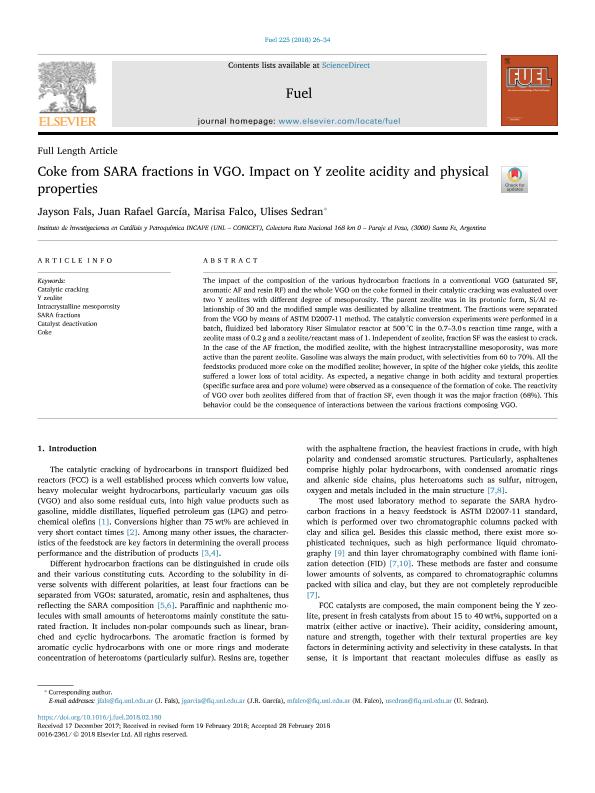Mostrar el registro sencillo del ítem
dc.contributor.author
Fals Guerra, Jayson

dc.contributor.author
García, Juan Rafael

dc.contributor.author
Falco, Marisa Guadalupe

dc.contributor.author
Sedran, Ulises Anselmo

dc.date.available
2018-11-01T19:13:00Z
dc.date.issued
2018-08
dc.identifier.citation
Fals Guerra, Jayson; García, Juan Rafael; Falco, Marisa Guadalupe; Sedran, Ulises Anselmo; Coke from SARA fractions in VGO. Impact on Y zeolite acidity and physical properties; Elsevier; Fuel; 225; 8-2018; 26-34
dc.identifier.issn
0016-2361
dc.identifier.uri
http://hdl.handle.net/11336/63489
dc.description.abstract
The impact of the composition of the various hydrocarbon fractions in a conventional VGO (saturated SF, aromatic AF and resin RF) and the whole VGO on the coke formed in their catalytic cracking was evaluated over two Y zeolites with different degree of mesoporosity. The parent zeolite was in its protonic form, Si/Al relationship of 30 and the modified sample was desilicated by alkaline treatment. The fractions were separated from the VGO by means of ASTM D2007-11 method. The catalytic conversion experiments were performed in a batch, fluidized bed laboratory Riser Simulator reactor at 500 °C in the 0.7–3.0 s reaction time range, with a zeolite mass of 0.2 g and a zeolite/reactant mass of 1. Independent of zeolite, fraction SF was the easiest to crack. In the case of the AF fraction, the modified zeolite, with the highest intracrystalline mesoporosity, was more active than the parent zeolite. Gasoline was always the main product, with selectivities from 60 to 70%. All the feedstocks produced more coke on the modified zeolite; however, in spite of the higher coke yields, this zeolite suffered a lower loss of total acidity. As expected, a negative change in both acidity and textural properties (specific surface area and pore volume) were observed as a consequence of the formation of coke. The reactivity of VGO over both zeolites differed from that of fraction SF, even though it was the major fraction (68%). This behavior could be the consequence of interactions between the various fractions composing VGO.
dc.format
application/pdf
dc.language.iso
eng
dc.publisher
Elsevier

dc.rights
info:eu-repo/semantics/openAccess
dc.rights.uri
https://creativecommons.org/licenses/by-nc-sa/2.5/ar/
dc.subject
Catalyst Deactivation
dc.subject
Catalytic Cracking
dc.subject
Coke
dc.subject
Intracrystalline Mesoporosity
dc.subject
Sara Fractions
dc.subject
Y Zeolite
dc.subject.classification
Otras Ingeniería Química

dc.subject.classification
Ingeniería Química

dc.subject.classification
INGENIERÍAS Y TECNOLOGÍAS

dc.title
Coke from SARA fractions in VGO. Impact on Y zeolite acidity and physical properties
dc.type
info:eu-repo/semantics/article
dc.type
info:ar-repo/semantics/artículo
dc.type
info:eu-repo/semantics/publishedVersion
dc.date.updated
2018-10-23T18:19:28Z
dc.journal.volume
225
dc.journal.pagination
26-34
dc.journal.pais
Países Bajos

dc.journal.ciudad
Amsterdam
dc.description.fil
Fil: Fals Guerra, Jayson. Consejo Nacional de Investigaciones Científicas y Técnicas. Centro Científico Tecnológico Conicet - Santa Fe. Instituto de Investigaciones en Catálisis y Petroquímica ; Argentina
dc.description.fil
Fil: García, Juan Rafael. Consejo Nacional de Investigaciones Científicas y Técnicas. Centro Científico Tecnológico Conicet - Santa Fe. Instituto de Investigaciones en Catálisis y Petroquímica ; Argentina
dc.description.fil
Fil: Falco, Marisa Guadalupe. Consejo Nacional de Investigaciones Científicas y Técnicas. Centro Científico Tecnológico Conicet - Santa Fe. Instituto de Investigaciones en Catálisis y Petroquímica ; Argentina
dc.description.fil
Fil: Sedran, Ulises Anselmo. Consejo Nacional de Investigaciones Científicas y Técnicas. Centro Científico Tecnológico Conicet - Santa Fe. Instituto de Investigaciones en Catálisis y Petroquímica ; Argentina
dc.journal.title
Fuel

dc.relation.alternativeid
info:eu-repo/semantics/altIdentifier/doi/http://dx.doi.org/10.1016/j.fuel.2018.02.180
Archivos asociados
